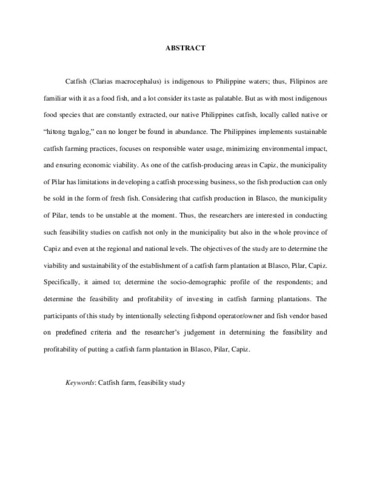Blasco Catfish Farm Plantation in Pilar, Capiz
| dc.contributor.advisor | Borgonia, Evelyn B. | |
| dc.contributor.author | Bacalangco, Carl F. | |
| dc.contributor.author | Banate, Kian Ram B. | |
| dc.contributor.author | Bernas, Jocel V. | |
| dc.contributor.author | Fuentes, Jenalyn O. | |
| dc.contributor.author | Grandeza, Christine Fe M. | |
| dc.coverage.spatial | Capiz | en |
| dc.date.accessioned | 2025-08-01T06:01:15Z | |
| dc.date.available | 2025-08-01T06:01:15Z | |
| dc.date.issued | 2024-06 | |
| dc.identifier.citation | Bacalangco, C.F., Banate, K.R.B., Bernas, J.V., Fuentes, J.O., & Grandeza, C.F.M, (2024). Blasco Catfish Farm Plantation in Pilar, Capiz [Undergraduate thesis, Capiz State University Pilar Satellite College]. CAPSU Institutional Repository. | en |
| dc.identifier.uri | https://repository.capsu.edu.ph/handle/123456789/889 | |
| dc.description.abstract | Catfish (Clarias macrocephalus) is indigenous to Philippine waters; thus, Filipinos are familiar with it as a food fish, and a lot consider its taste as palatable. But as with most indigenous food species that are constantly extracted, our native Philippines catfish, locally called native or “hitong tagalog,” can no longer be found in abundance. The Philippines implements sustainable catfish farming practices, focuses on responsible water usage, minimizing environmental impact, and ensuring economic viability. As one of the catfish-producing areas in Capiz, the municipality of Pilar has limitations in developing a catfish processing business, so the fish production can only be sold in the form of fresh fish. Considering that catfish production in Blasco, the municipality of Pilar, tends to be unstable at the moment. Thus, the researchers are interested in conducting such feasibility studies on catfish not only in the municipality but also in the whole province of Capiz and even at the regional and national levels. The objectives of the study are to determine the viability and sustainability of the establishment of a catfish farm plantation at Blasco, Pilar, Capiz. Specifically, it aimed to; determine the socio-demographic profile of the respondents; and determine the feasibility and profitability of investing in catfish farming plantations. The participants of this study by intentionally selecting fishpond operator/owner and fish vendor based on predefined criteria and the researcher’s judgement in determining the feasibility and profitability of putting a catfish farm plantation in Blasco, Pilar, Capiz. | en |
| dc.language.iso | en | en |
| dc.publisher | Pilar Satellite College, Capiz State University | en |
| dc.subject | Catfish farm | en |
| dc.subject | feasibility study | en |
| dc.title | Blasco Catfish Farm Plantation in Pilar, Capiz | en |
| dc.type | Thesis | en |
| dc.contributor.chair | Borgonia, Evelyn B. | |
| dc.contributor.committeemember | Borgonia, Evelyn B. | |
| dc.contributor.committeemember | Alferes, Apple Joy A. | |
| dc.contributor.committeemember | Borres, Joesan D. | |
| thesis.degree.discipline | Marketing Management | en |
| thesis.degree.grantor | Capiz State University Pilar Satellite College | en |
| thesis.degree.level | Undergraduate | en |
| thesis.degree.name | Bachelor of Science in Business Administration | en |
| thesis.degree.department | Business Administration | en |
| dc.subject.scientificname | Clarias macrocephalus | en |
Files in this item
This item appears in the following Collection(s)
-
Undergraduate Theses [467]

